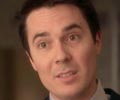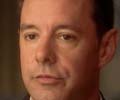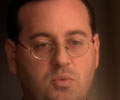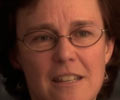- People
- Ryan Lizza
- David Mendell
- Cassandra Butts
- Bradford Berenson
- Christine Spurell
- Janny Scott
- Related Links
- In Law School, Obama Found Political Voice
"He arrived there as an unknown, Afro-wearing community organizer who had spent years searching for his identity; by the time he left, he had his first national news media exposure, a book contract and a shot of confidence from running the most powerful legal journal in the country." (The New York Times, Jan. 28, 2007) - First Black Elected to Head Harvard's Law Review
The New York Times covers Obama's election as president of the Harvard Law Review. (Feb. 6, 1990) - Obama Kept Law Review Balanced
The Politico.com reviews the content of the "eight dense volumes" produced during Obama's tenure. (June 23, 2008)
Ryan Lizza The New Yorker
 Read the full interview >
Read the full interview >
Before [Obama] went off [to Harvard], he said to some of his community-organizing buddies he needed that credential, that Harvard Law degree, to access the corridors of power and to have that credential because he wasn't going to get that as a community organizer in Chicago.
It's all about power.
It's all about power. When you say that, it can have a very negative connotation. And this is one of the great questions about Obama. When people start community organizing, and they learn that the whole ethos of the community organizer is to understand power, this can sound sort of negative. In fact, [in] the seminars that Obama went through, this was drilled into his head: Don't think of power as a negative thing. Power is the only thing that changes anything.
David Mendell Author, Obama: From Promise to Power
 Read the full interview >
Read the full interview >
Harvard Law, I think in his own mind, really helped him establish himself as an elite person in our society. It taught him that he could manage various worlds. Here he was in this very rarified environment, and people took to him there. And he was also in the projects of Chicago, and people there seemed to take to him as well -- take to his personality and what he was trying to do and his, I think, genuine sense of mission. ...
Cassandra Butts Harvard Law, class of '91; Obama adviser
 Read the full interview >
Read the full interview >
When he takes over at the Law Review, how important is that?
It was pretty significant. He was the first African American president of the Law Review ... ascending to what was the highest, most coveted position for a student at the law school. ...
I was as close to Barack as anyone in law school. He'd never expressed an interest in being president of the Law Review. It wasn't something that he talked about. Frankly, he was drafted by his colleagues on the Law Review to run. They made the case why he should run and why they thought that he could lead the Law Review. And they thought that he would be able to bring together the factions that had developed as a result of the ideological divisions on the Law Review, on the left and the right. …
Why? What was it about him?
Barack, from the start, had a leadership style that was very embracing. He was clearly seen as a leader, but at the same time, he didn't put himself out as a leader. We had a lot of people who were pretty ambitious at the law school, people who had political ambition. They were not quiet in their political ambition and putting themselves out as leaders.
That wasn't Barack. He had a very quiet, yet very calm presence. And his leadership style was such that people were drawn to him and they embraced him as a leader, and they put him forward as a leader. ... It's personality, but it's also a function of his experience as a community organizer. As a community organizer, you are not the person who's out in front. You want the community to be out in front. You want the community to be the ones who are voicing the concerns and who are the leaders. …
When he's sitting at a sort of supercharged, maybe dichotomous Harvard Law School ... yes, he's African American ... but he can talk and be attractive to Brad Berenson [associate White House counsel, 2001-2003,] and the Federalist Society.
Absolutely. He essentially spent his life trying to synthesize the duality of being one person in one place and being another person in another place. What I like to say to people is that Barack never meets a stranger, and that's one of the things that makes him so effective as a politician. When he meets people, when he sees people, when he's interacting with people, he isn't inclined to stereotype people. He ultimately has met you before in some other experience, or someone just like you. …
Barack was not and is not predictable. He's thoughtful. He'll tell you what he believes. But it isn't always what you expect. … His ideological approach is to the left and there was an expectation that as the president of the Law Review that he would side on the part of his more progressive colleagues. But he recognized that his role was such that he had to bring both sides together. And in order to publish the Law Review and to be productive in his term as president, he had to figure out how to make it work and how to make both sides work together, which meant that he wasn't always going to side with his progressive colleagues, that he had to take the interests and the ideas of the people on the right into account.
It's not to suggest that where he was on the issue was being reflected in the decision that he made. But it did reflect what he needed to do as a leader in order to produce the Law Review. …
It is Barack's natural inclination to reach across the aisle. It's personality. And it's also just his intellect. … He's not interested necessarily in dominating the conversation. He wants to bring people into the conversation. He wants to understand different points of view. And understanding those different points of view informs the way he thinks about issues. …
Bradford Berenson Harvard Law, class of '91; associate White House counsel, 2001-'03

The law school generally at that time was riven ideologically, and not just in terms of Republican/Democrat partisan politics, but there were contending schools of legal thought at the time, represented on the faculty, that really polarized both the faculty and the student body. There was a far-left group of professors who adhered to what was known as critical legal studies, and then there were a handful of conservative professors, like Charles Fried, who had served in the Reagan administration. There were intense debates over affirmative action and race issues. This is, after all, just a few years after the end of the Reagan presidency. ...
That doesn't mean that, day to day, people weren't friendly to one another, but the classroom was very politicized. The debates and discussions of the law and of cases frequently pit conservatives in our class against liberals in our class, and the discussions often got quite heated. I would say the environment at Harvard Law School back then was political in a borderline unhealthy way. It was quite intense.
... Interestingly, race was at the forefront of the agenda. There were intense debates over affirmative action that sometimes got expressed through fights over tenure decisions relating to junior faculty at the law school. There were women professors and minority professors who either had come up for tenure or were coming up for tenure, and there were big fights, on the faculty and in the law school at large, over whether they should receive tenure, whether the quality of their scholarship merited that. ...
[A]fter [Obama] became president of the Review, he was under a lot of pressure to participate and lend his voice to those debates. And he did, I think, to some degree. But I would not have described him as a campus radical or a campus political leader. He was the president of the Harvard Law Review, the leader of that organization. But, in that role, his job was to manage, in essence, a publication, and the editors who brought it forth and to do a lot of close editing of academic legal articles. …
You don't become president of the Harvard Law Review, no matter how political, or how liberal the place is, by virtue of affirmative action, or by virtue of not being at the very top of your class in terms of legal ability. Barack was at the very top of his class in terms of legal ability. He had a first-class legal mind and, in my view, was selected to be president of the Review entirely on his merits.
... I never regarded him as kind of a racial special pleader, or a person looking for race-based benefits, either for himself or others. I think as a policy matter, he supported affirmative action and believed in the arguments for it. But unlike many people on the left, he was also willing to acknowledge that it had costs, and he could at least appreciate the arguments on the other side. ...
Just in a political sense, what kind of a person were you looking for [to serve as president]? ...
The block of conservatives on the Law Review my year I think was eager to avoid having any of the most political people on the left govern the Review. I mean, the first bedrock criterion, I think for almost all of the editors, was to have somebody with an absolutely first-rate legal mind who would be able to engage competently with the nation's top legal scholars on their scholarship and on these articles, and who would provide the intellectual leadership for the Review that it always needed. That was non-negotiable for almost everybody right or left.
But there were a number of people that would have met that criterion. There were at least a large handful who probably had the intellectual and personal characteristics to be good leaders of the Review. From among those, the conservatives were eager to have somebody who would treat them fairly, who would listen to what they had to say, who would not abuse the powers of the office to favor his ideological soul mates and punish those who had different views. Somebody who would basically play it straight, I think was really what we were looking for.
Was that hard to find?
It was very hard to find. And ultimately, the conservatives on the Review supported Barack as president in the final rounds of balloting because he fit that bill far better than the other people who were running. ...
We had all worked with him over the course of a year. And we had all spent countless hours in the presence of Barack, as well as others of our colleagues who were running, in Gannett House [the Law Review offices], and so you get a pretty good sense of people over the course of a year of late nights working on the Review. You know who the rabble-rousers are. You know who the people are who are blinded by their politics. And you know who the people are who, despite their politics, can reach across and be friendly to and make friends with folks who have different views. And Barack very much fell into the latter category. ...
[After Obama is selected,] he does a very able job as president. Puts out what I think was a very good volume of the Review. Does a great job managing the difficult and complicated interpersonal dynamics on the Review. And manages somehow, in an extremely fractious group, to keep everybody almost happy.
Some of the people who are not as happy as others, I think much to their surprise, are some of the African American people who believe that now it's their turn.
Absolutely right, absolutely right. I think Barack took 10 times as much grief from those on the left on the Review as from those of us on the right. And the reason was, I think there was an expectation among those editors on the left that he would affirmatively use the modest powers of his position to advance the cause, whatever that was. They thought, you know, finally there's an African American president of the Harvard Law Review; it's our turn, and he should aggressively use this position, and his authority and his bully pulpit to advance the political or philosophical causes that we all believe in.
And Barack was reluctant to do that. It's not that he was out of sympathy with their views, but his first and foremost goal, it always seemed to me, was to put out a first-rate publication. And he was not going to let politics or ideology get in the way of doing that. ...
He had some discretion as president to exercise an element of choice for certain of the positions on the masthead; it wasn't wide discretion, but he had some. And I think a lot of the minority editors on the Review expected him to use that discretion to the maximum extent possible to empower them. To put them in leadership positions, to burnish their resumes, and to give them a chance to help him and help guide the Review. He didn't do that. He declined to exercise that discretion to disrupt the results of votes or of tests that were taken by various people to assess their fitness for leadership positions.
He was unwilling to undermine, based on the way I viewed it, meritocratic outcomes or democratic outcomes in order to advance a racial agenda. That earned him a lot of recrimination and criticism from some on the left, particularly some of the minority editors of the Review. ...
It confirmed the hope that I and others had had at the time of the election that he would basically be an honest broker, that he would not let ideology or politics blind him to the enduring institutional interests of the Review. It told me that he valued the success of his own presidency of the Review above scoring political points of currying favor with his political supporters.
Christine Spurell Harvard Law, class of '91

Honestly, we were just very polarized on the Law Review, we really were. It's like you go to a college campus, and the black students were all sitting together. It was the same thing with the Law Review; the black students were all sitting together. Barack was the one who was truly able to move between the different groups and have credibility with all of them.
Why?
I really don't know. He grew up in a multiracial environment. I don't know what he's like now with conservatives, but I don't know why at the time he was able to communicate so well with them, even spend social time with them, which was not something I would ever have done. …
I don't think he was agenda-driven. I think he genuinely thought, some of these guys are nice, all of them are smart, some of them are funny, all of them have something to say. …
Now, as you may know, I had personal hopes for my own future on the Law Review. I was kind of hoping to get a masthead position, and I did not get a masthead position. So we went from the high of having Barack elected -- now, this is just me speaking, as at the time I was a very narrow-minded, almost radical student. I was 22 years old at this point, so I kind of saw everything in terms of race. I try not to do that anymore.
So I did assume I would get the position that I thought I had coming. I [did] think I had earned it as far as the quality of my work. But I'll tell you now, I had not earned it as far as the quality of my diplomacy with the other students. ... He did know I was a hard worker, that he did know. That's why I felt betrayed, because I worked so hard. I pulled so many all-nighters, I thought I should be rewarded. But he put the good of the Law Review ahead of my agenda. That's what makes him such a great leader. ...
It's been written that you guys were very friendly, but you'd go at each other. ...
[T]hat was the period right after he appointed the masthead. It coincided with some movement, I'm not even sure who started it, to fix certain things about the Law Review. ... Getting certain African American editors onto the Law Review they thought shouldn't be there was probably one of the issues.
Now, if I had been president and someone was wanting to change that, I would have shut them down. But Barack, being a much better leader than me, allowed for open and robust discussion. He actually believed and showed that he believed that when you debate things openly and intelligently, the best ideas will win. So there were protracted debates, and he permitted them. And he permitted things to go to votes.
Janny Scott The New York Times

Apparently, while he was an editor of the Law Review, he was involved in the editing of a piece by Michael McConnell, who was a conservative constitutional law scholar who later was appointed by President George W. Bush to the Federal Court and was considered as a Supreme Court nominee, or was one of the people listed around the time of [Justice Samuel] Alito and [Chief Justice John] Roberts' appointments.
According to a professor at the University of Chicago, Douglas Baird, he got a call, or got a note, from Michael McConnell, who ... was definitely an alumnus of the University of Chicago Law School, saying, "I encountered this really remarkable, brilliant guy at Harvard Law Review when they were working on my piece, and you should have this guy on your radar." And so it was this very conservative legal scholar who brought Obama to the attention of the University of Chicago.
So Douglas Baird called Obama up at Harvard Law School -- I guess it must have been in his last year -- and said, "Do you have any interest in teaching?" Because, Baird said to me, "We rarely get that kind of unqualified endorsement, particularly from someone as well-known and respected as McConnell." ...
And Obama said, "Well, no, actually. What I want to do is write this book." This was at the moment where the newspaper articles and everything about his election had attracted the interest of publishers, and he'd gotten a book contract. So his first contact at the University of Chicago, which was where he later ended up teaching, was an attempt to just bring that guy there, since he was thought to be so sharp and worth following.